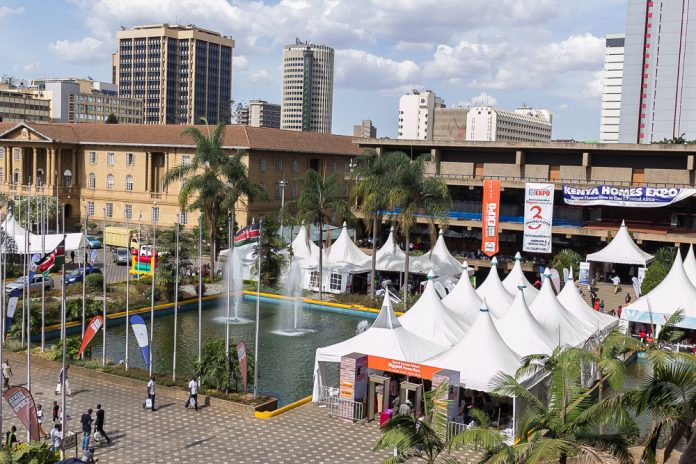Blue Triangle Cement 27th Kenya Homes Expo 2018, a biannual event that brings together players in the real estate industry was officially opened on Thursday 11th at KICC.
In attendance was Houranable Christopher Obure Chief Administrative Secretary from the Ministry of Transport Infrastructure Housing Urban Development and Public Work, Daniel Ojijo, Executive Chairman Homes Universal, Peter Ole Nkeri, Managing Director, Blue Triangle Cement
“This October marks the 27th time we are hosting the Kenya Homes Expo, and it is our great privilege to say that we continue to be the embodiment of the ideal forum that meets the needs of the fast-rising consumer market in East & Central Africa. We are proud to host region’s most epic event that hugely reflects the dynamics and trends of the real estate sector in East, and Central Africa and regionally,” said Danie Ojijo, Managing Director Homes Kenya Limited
Blue Triangle Cement 27th Kenya Homes Expo 2018,” Homes for All “ was inspired by the positive government initiative to provide social and affordable housing to the less privileged in the society under the BIG 4 Agenda.

The Kenya Homes Expo continues to identify and harness opportunities that encourage people with an interest in the real estate sector. The expo is an ideal platform for industry players across to built an environment to network, share and contribute to overall growth and positive business climate.
Exhibitors have opportunities to showcase, demonstrate the latest product or services, study activities of other players and examine recent trend and activities. It’s a powerful platform for meeting new customers, reaching out to existing clientele and building a more established and reliable brand
This year, the expo has attracted over 40000 buyers within four days, who are seeking concrete deals almost immediately. It is set to address the acute housing shortage, support the growth of the housing industry and creates synergy between industry players.

It is estimated that the current housing deficit stands at 2 million houses with nearly 61% of urban households living in slums. This deficit continues to rise due to fundamental constraints on both the demand and supply side and is exacerbated by an urbanization rate of 4.2%, equivalent to 0.5 million new city dwellers every year.
With this level of growth, Kenya requires approximately 200,000 new housing units annually to meet demand, yet only 50,000 homes are built, leaving the housing deficit growing by 150,000 units per year. As a result of this mismatched supply and demand, housing prices have increased by 100% since 2004.
“The master plan will be to establish the demand and affordability of housing in all counties affordable housing unit from. Providing key infrastructures like roads, water, electricity, sewer telecommunication services educational facilities, health among other will reduce the cost of construction and the burden on developers, making resultant units affordable” noted Chris Obura
The real estate parties look forward to the 1m housing units over the next 5 years targeted promised by our president under the big 4 agenda. The affordable housing programme is tailored to address key concerns namely land finance, infrastructure, technology, and legislation.
However, The real estate sector still has its immense challenges that need to be addressed.
Unavailability of service infrastructure and proper urban planning. A survey undertaken by CAHF shows that the average land and infrastructure cost in Kenya makes up 10 to 35% of the total cost of construction. At 2018 prices, the average price of a 1 to 3 bedroom unit is KES 14m, while a 4 to 6 bedroom property was KES 42m.
The supply of affordable houses with prices of KES 3m and below has been low partly due to the high cost of construction with Kenya being ranked as having the highest cost of construction among sixteen African countries. Construction finance loans are adverse to developers given the time is taken in converting the construction debt into a mortgage towards the end of construction. Developers incur high financing costs during the period and consequently price this cost in when selling the property.

Unaffordable and inaccessible mortgages: An average mortgage size of KES 9.1m with an interest rate of 13.5% and a tenure of 12 years translates to monthly mortgage payments of KES 130,700, which is unaffordable to over 90% of Kenyans. Inefficient Titling Process: It takes 9 procedures and an average of 61 days to register property in Kenya. The registration process is further complicated by devolution with different counties showing different levels of efficiency
“On land, the government is committed to streamlining the transaction process to encourage efficiency, Incorporating Kenya Remortgaging Refinancing Company and operationalizing The national housing development fund that will aggregate demand and a segregate are market according to profitability and preference,” said Obura
“We are working with relevant ministries and government departments in the infrastructure sector to provide support under the affordable housing program. There are 20 industrial Building System providers and manufactures to help with the technology. We are proposing various amendments for a piece of legislation to create an affordable housing unit,” he added
An additional 6% will be to the unit cost for incidentals, including stamp duty, legal fees and valuation fee saims estimates that the affordable homes programmmes wqill double the contirbution of reals estat and construction to GDP from 7 to 14% in 2022









